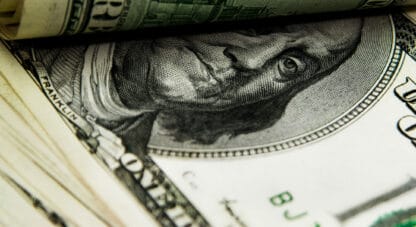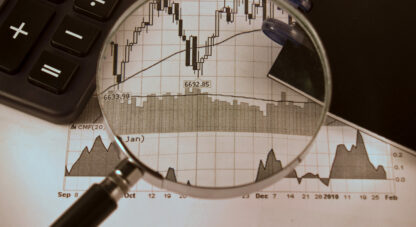The McAlvany Weekly Commentary
with David McAlvany and Kevin Orrick
Kevin: Our guest today is Marc Faber. David, we have had Marc on numerous times throughout the year, but this time is key, because there are some important announcements coming out in the middle of September, pre-election, that could really affect the entire fall.
David: Marc is pretty good at calling inflexion points, and when he sees things, both from a fundamental and technical standpoint, on knife’s edge, he is willing to call it like it is. Looking at the middle of the month, next month, we have ECB meetings and the Fed governors’ meetings. We have those combined, and what has been built into the system, in terms of pricing, may come right back out. So being cautious, being concerned about where the equities markets are, is something we want to engage with Marc today. Where are we, and where are we going? We want to look back at the first decade of this new century, and frankly, we have seen a remarkable number of transitions, trends that have been put in place.
Marc, to your mind, what are the primary trends that are in place, and what might alter their course?
Marc Faber: I think that if you look at the years 1980 to 1998 or 2000, we were in a bear market for commodities, and what has been striking over the last 10-12 years, is the very strong performance of commodities and obviously, also of the Chinese economy that has really come a long way. It is challenging now essentially the largest economy in the world, which is the United States, so these are two well-established trends. Of course, commodities are unlikely to continue to appreciate at the same rate they have done in the last 10-12 years.
There will be setbacks, and also we have to be aware that commodities do not move all in concert. In other words, the price of cocoa and coffee have nothing to do with the price of copper and of nickel and of aluminum. Different commodities will move at different times, but in general, that is the trend that has prevailed for the last ten years, very strong increases in commodity prices, especially until 2008, and the emergence of China as a very powerful and large economy on the world stage.
In some sectors of the market, in some goods markets, they are the largest economy, say, for mobile phones, computers, internet uses, etc., due to its large population, which is twice as large as the U.S. and Europe combined.
David: So this trend for China, obviously, has been a growth trend and going back to your book, Tomorrow’s Gold, and in the earlier part of this decade you had looked at this expansion before it occurred, in large part, and there does appear to be a slowing of growth from double-digit now to single-digit, still high, single-digit growth, but some things that might portend a slowing in the Chinese economy.
The Taiwanese trade and the Korean trade with China are also in decline. Perhaps you could speak to the impact that that might have, the areas that are most vulnerable if this trend of declining growth in China is to continue. Is this an Australian story? Is this an industrial commodities story? Where do you think the greatest risks lie?
Marc: I think that, obviously, we had very powerful growth in China until 2008, and then we had the global crisis, and the reaction of China was to trade money massively. In other words, after very strong credit growth and very large fiscal deficits, I think that now the economy has slowed down much more than official statistics would suggest, because as we just pointed out, the more reliable statistics, like trade from Korea, exports from Korea, exports from Taiwan, gambling revenues in Macao, electricity consumption, exports, is all down, or flat.
I think that, obviously, if the Chinese economy has slowed down this much, it will slow down further. We could debate whether China will have a crash in the economy or just a major slowdown. But regardless, I think that the demand for industrial commodities will not grow at the same rate it has grown in the last 10-12 years.
David: When we look at the rest of the world, two of the primary inputs, at least in terms of exports from China, would be to Europe and to the United States, and when we look at the eurozone, they are still in crisis. Perhaps you could give us a brief summary of where the eurozone is, in your opinion, and where it is going if it is to survive in its current form.
Marc: That is an easy question. I think the eurozone is in recession, if you add up everything. There is one economy that is performing reasonably well, but there has been a significant slowdown there, as well, and that is Germany. The other economies are not growing any more, and some of them are contracting.
I think that this is a structural shift that will not blow over within half a year or one year. I think this is a very long-term problem, and so the exports from China to Europe will be disappointing, and at the same time, because of the slowdown in China, the exports from Germany and other European countries to China will be disappointing, and so we have, essentially, a weak global economic environment.
David: With this in mind, there is a variety of asset classes which have either done very well, or hang in the balance in terms of risk and reward. We have the Fed, which does not seem to view the U.S. Treasury market as a bubble, in spite of prices increasing for over 30 years, and yields being pushed to incredibly low levels. Arguably, yields can still go lower, but you seem at this point to be more comfortable with the prospects of equities than betting on the competency of government or placing hard-earned capital in government bonds. Perhaps you could explore that.
Marc: I think that if you print money, the difficulty is to know where the money will flow to. It flowed into the NASDAQ until March 2000 and it created the world’s biggest credit bubble until 2007. And then that credit bubble flowed into the housing market and created the housing bubble. Then in 2008 we had the commodities bubble. I think if I look at the valuation of equities around the world, they are not particularly high, they are reasonable.
But who knows? Maybe the big bubble is in earnings. We have had a very strong recovery in corporate profits in terms of margins. They are way above the average for the last 50 to 100 years. They are above the trend line, and the second bubble we may have is in government bonds and in fiscal deficits. I think all these bubbles will eventually deflate one way or the other, maybe not voluntarily.
David: Looking at assets, priced not in nominal terms, but priced in gold, it appears that a great deflation has occurred, and continues unabated with a radical increase in purchasing power over the last decade, priced in gold. What assets, in your opinion, are most vulnerable today? Or to restate that, where might purchasing power radically improve from here?
Marc: That is a good question. I think that selected real estate in the U.S. is inexpensive, and I think that it is very difficult to value anything if interest rates are at zero, but in Asia we have lots of companies that have dividend yields of perhaps 5% or 6%. Compared to zero interest rates on deposits and less than 2% on 10-year Treasuries, I think that these stocks are reasonably okay, but they are not cheap. They are not as cheap as they were in March 2009. Most stocks around the world have actually doubled since March 2009 with the exception of the European market.
I don’t think that anything is terribly cheap. I think, in general, if I really have to make a bet on what is relatively cheap, I would still argue that probably gold is relatively cheap, because there has been a lot of money printing around the world, debt has exploded everywhere, we have a government bond bubble, and we have a fiscal deficit bubble, so I think that gold is probably still okay.
David: What is your sense of silver relative to gold, or just as a stand-alone?
Kevin: I have no idea. They have moved in the same direction. I prefer gold and other people prefer silver, but they are moving in the same direction. It is not going to be that gold goes up 20% and silver drops 20%. It is going to be gold and silver moving up together, maybe silver more than gold, and maybe gold more than silver, or moving down together, maybe gold more, and maybe silver more, that I don’t know. But in general, obviously, they will move together.
David: What could you say about the fact that we already have deflated assets, which offer, I guess, some protection via relative valuations? Perhaps these are safer than even traditional safe havens. For example, we could choose to own Treasuries or German bunds today, or on the other hand you could consider Italian or Spanish equities, just as an example of a very depressed asset. Of course, you still have the currency devaluation risk implicit if you were to see the Spanish leave the eurozone, or perhaps less likely, the Italians leave the eurozone.
But how do you see this game today? An investor wants to preserve value, preserve assets, and yet the two “safe havens,” bunds and Treasuries, from one perspective, are very safe, from another perspective, are perhaps, the most risky assets out there. How do you parse, how do you understand, the risk, and appraise that kind of decision-making process?
Marc: I think we have to start from the view that, basically, once a government intervenes into the market mechanism, the price information system breaks down, and so you can have significantly distorted pricing mechanisms, and I would argue that, yes, in the case of bunds, and the U.S., and CDs, and Swiss franc bonds, in other words, we have a completely disconnected market, and I think, eventually, the yields that are now extremely low will keep going higher.
But if you ask me if the 10-year Treasury drops once again to around 1.4% or 1%, I would say it is possible, but over a ten-year period, if we were to take an investment stand for the next ten years, then I think equities are more attractive than, for example, government bonds.
David: Keeping an open mind to all potential outcomes, let’s look at deflation. If a deflationary scenario á la Robert Prechter is reasonable, is it a question of select assets deflating, particularly leveraged assets, which tend to carry a little bit more vulnerability, or is it just deflation of all assets from a particular level? We clearly have de-leveraging, like gravity, which seems to be a natural force at work in the market, but on the other hand, we have central bankers who are working against this trend, with limited tools, which inherently seem inflationary. So you have this conflict: Do we go back to select asset classes, or everything deflating, but just from a different level?
Marc: I think if we look at periods of heavy money printing in history, they are characterized by prices essentially moving up, but they don’t move up in concert, and they don’t move up at the same time, with the same intensity. In other words, as I just mentioned, until March 2000 we had a gross inflation in NASDAQ stocks, and we had the inflation in housing companies and in housing prices, and then in 2008 we had an increase from September 2007 in the case of oil from $78 to a peak of $147 in July 2008, so different assets can move up at different times.
And the same has happened in deflation. So I think that if someone took a very bearish view of the world, and would think the whole world is going to deflate, I would suggest that some home prices in the U.S. are near, or close to, a major low.
David: When we consider the options that we have today as investors, asset preservation has to be, if you will, a core goal, and you have suggested that diversification is critical, because there is a requisite humility in the investment process, understanding that you don’t know everything, you cannot predict the future. Maybe you could speak a little bit to diversification, as there is sometimes a temptation to load the boat in one direction.
Marc: In my experience, especially over the last few years, I have seen that investors have performed very badly. In the 1980s and 1990s, whoever was long stocks performed reasonably well, whether he was long stocks in the U.S., or in Europe, or in Asia. That has now changed, and I think that in the absence of knowing, we all know that the consumer is in bad shape. We know that the economy, globally, is not in good shape. We know that the governments have very heavy debts, and very heavy fiscal deficits, and that these debts will be growing.
This we all know. But what we don’t know is, to what extent will central banks print money? I think they will print probably more than is expected, and so in this money printing environment, I think that long-term government bonds are not attractive, and equities are moderately attractive – they’re not dramatically attractive, but moderately attractive.
David: This is, perhaps, a psychological or philosophical question, but perhaps you can explore what takes place in a re-evaluation of risk. An asset previously believed to be safe and now scorned, for instance, GSEs like Fannie Mae and Freddie Mac paper, which were truly the gold standard in the fixed income space, giving you the best benefits of high income and the government guarantee. What does it take for perception to switch from something being safe, to now being a risk asset?
Marc: This is a very good question, because let’s say we have kind of a gold standard, and sound money. In other words, when you have an environment where money is not being printed in unlimited quantities, then obviously, traditionally, the safest asset is to own cash, and Treasury bills, and then government bonds, and then municipals and corporate bonds, and then equities, and the most risky are basically commodities.
But in the current environment, looking ahead ten years, let’s say we were to go on a holiday for ten years and then we came back. I think it would be very risky to put all of our money into cash and hope that the purchasing power would be maintained over the next ten years. I think it will go down substantially because we have negative real interest rates and these negative real interest rates will continue.
Under normal conditions, cash and government bonds are safe. But in this environment, in my view, they are no longer safe. Now, what is the safest? Is it gold? Is it real estate, at these depressed prices? Or is it equities? That we don’t know for sure. But I am quite sure that over the next ten years bonds are not a particularly desirable, nor a particularly safe, place to be positioned in.
David: When we go back to that first assumption that if you look at bonds, if you look at Treasuries, if you look at cash holdings as reliable, on the basis that they are tied to a gold standard, do you foresee any time in the next decade or two, an openness, philosophically, to a return to either partial remonetization, or full remonetization, either in the West, or in the East?
Marc: I believe that today’s system of government and central banks will not return to anything close to a gold standard. They are too deep in this mess. They will continue to print money and keep the system kind of humming along. But there will be a time when the system breaks down, and I think we had the first phase of it in 2008.
In the meantime, the situation in the world has worsened in terms of the debt explosion. We have highly unstable markets, very volatile markets, and I think eventually the whole derivatives market will cease to exist, and the whole financial system will have to be redesigned. At that stage I suppose that gold will have an important role to play, but as I said, it won’t happen on the back of the governments getting together and saying we will have to discipline ourselves more, so let’s go back to the gold standard. I think it will happen as a result of a major breakdown in the system.
David: As we begin to wrap up, I would love to get an outsider’s perspective on what in the U.S. market will be significant, the elections which are pending, the election season, which we are into. Does it really matter who takes office after November, as to how it will affect next year, 2013, Republicans or Democrats? How much is already baked into the cake, so to say, fiscally and economically? Or are there some real reforms which reasonably could be put in place to turn things around from the economic standpoint here in the United States?
Marc: I think that the Democrats will argue, that if the Republicans come into power we will have a fiscal cliff and problem and maybe social unrest, and I think that the Republicans will argue that it is a disaster if Obama is re-elected. But quite frankly, to my mind, it won’t make much of a difference. The fiscal deficit will stay at above a trillion dollars, in my opinion, for as far as the eye can see. The spending pattern will be different. The Democrats will have more handouts, and the Republicans will have more defense spending, but the end result, in my view, is going to be pretty much the same, namely a very sluggish economy.
If you ask me what should be done, then obviously, we would have to reduce, in the Western world, the involvement, and the share of government in the economy, as a percentage of GDP. We would have to reduce that very meaningfully. U.S. spending is about 45% government related. It is a very large portion. And that is with full economic growth.
At the same time and this is really the work of Mr. Obama, we have an increasingly cumbersome regulatory environment, which just makes it very unappealing for any business to expand, especially the medium-sized and smaller businesses. They are faced, or confronted, with a huge increase in regulatory costs, and so they say to themselves, “Why would we hire under these conditions? Why would we expand under these conditions? We had better not do anything.” I think that both under the Republicans and under the Democrats we have structural problems that neither party will solve because of the dysfunctional nature of the U.S. government at the present time.
David: And perhaps just an insight, as you were originally from Switzerland, and have seen many changes in Switzerland over the last 20-30 years, and perhaps even more changes over the last 20-30 months, what is your sense of what is taking place in Switzerland, both in terms of linking the currency to the euro, keeping it pegged at 1.2 to the euro, and even what is taking place in the banking community? What are the pros and cons of Switzerland today?
Marc: For the first time in my life, I am actually deeply disappointed to be a Swiss. I like the Swiss passport, to travel around, and it is convenient. But I have to say that, number one, to peg the currency against the euro is a huge mistake, a huge mistake. And they are going to pay for it, eventually.
Number two, I think it is a disgrace that the Swiss banks essentially encourage people to gather assets all over the world from essentially people that were tax dodgers, that they would hand out to the American Department of Justice thousands and thousands of names of bank employees. I think we are a sovereign state and we should stand on that, and not just hand out any kind of documents. But there we have it, and I have to say, as a Swiss, I am deeply disappointed by this. But then again, I am also maintaining the view, “Never trust any government, any, anywhere in the world.”
David: What we appreciate is that we look at your newsletter on a monthly basis, and have enjoyed these conversations, going back now to 2008, and the regular conversations with you, is that you start with a deep philosophical basis. You are well read, well traveled, well educated, but that education has come in more than just degrees and formal study, and we appreciate the insight that you bring, it is a unique one, and we just want to thank you for the contribution that you make.
Marc: Thank you very much, but as I said, no matter well educated you are, we just don’t know exactly how the future will be, and that is why I want my readers and my investors to sleep at night, because money is the stress factor number one. By being diversified and not overly exposed to just one asset class, you sleep better. I get so many emails from people who worry because the price of gold has gone down. Why do they worry? Yes, they worry because they have all their money in gold. I also like gold, but I wouldn’t put everything in gold, and especially not on margin. There are people who short it, yes indeed, 50 points below where it is today. I don’t think that this is necessarily a very wise decision, because you don’t know how much money will be printed. I think that market action is horrible, I think the technical conditions have deteriorated, but it doesn’t mean that the market will go down right away. We could go up another 100 points from this relatively poor technical condition. I don’t think it will happen, this is not a projection. I think the market will probably peak out within the next ten days, then we will have a meaningful correction, then we will have to see what follows. In general, I think it is difficult to predict the markets when they are perfect markets, in other words, no participant has a dominant position in the market. It is impossible to predict the market that is manipulated.
David: Your sense is that today we have a higher level of manipulation in the markets, that being government intervention in the pricing structure, interest rates being suppressed beyond a natural rate and distorting pricing, perhaps across all asset classes? So price discovery is something that we don’t have access to?
Marc: I think we have almost as much manipulation as the socialist, communist, planned economy would have over the distribution of goods and services and the consumption of goods and services in an economy. We have a completely manipulated market, and it is the only reason the market has doubled since March 2009. I am not complaining because I saw it coming. It is money printing. Without the money printing, the S&P would be at 500-600, but with the money printing we have this profit inflation, and we have the money flowing, not into hiring new people, not into capital spending, but we have the money flowing, essentially, into speculation, mostly in equities.
David: Well, the two Bens have a lot to do with the next 60 days of market behavior – Benjamin Netanyahu could certainly enliven things a bit in terms of Middle East conflict, and Benjamin Bernanke could certainly heat things up in a pre-announcement coming into Jackson Hole. Do you have any opinion in terms of the two Bens?
Marc: I think the announcement ... whatever Mr. Bernanke does, I think the market has fully discounted it already. That is why I am not very optimistic about the market at this stage. That is why I said I think we will reach an intermediate peak either today or within the next 5-6 trading days. The other, Israel attacking Iran, is a possibility. But if you think about it, what will happen? Obviously, it would happen with the consent of the U.S., and the reaction to any market weakness would then be guaranteed money-printing, but guaranteed. Again, you have a disconnect because between the economic reality which is grave around the world, and the performances of equities, because the money is flowing somewhere and since we don’t have cash anymore, and so it goes, this leaves assets, whether paintings or gold or diamonds or stamps or farmland, or nowadays more real estate, and you just don’t know exactly which one will be the best performing asset. But in general, I would say, I think with Bernanke at the Fed, and if Mr. Romney gets elected, there would be most likely Mankiw. He’s of course an even greater money printer than Mr. Bernanke. So we are looking forward to more and more money printing.
David: I appreciate you joining us, I know it is late there in Asia. We will look forward to having you back into the conversation at some point in the future.
Marc: Thank you very much.
















